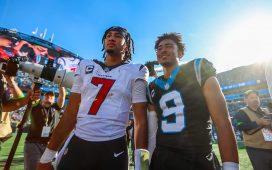It might come down to one swing of a boot, a goalkeeper’s save or a last-ditch tackle. But someone, at some point tomorrow afternoon, will transform the world in which their club exists.
The Championship play-off final has become renowned for being football’s richest game and the latest, between Nottingham Forest and Huddersfield Town at Wembley on Sunday, is no different as the gates of the Premier League slide open for one club.
Even on the weekend that sees Liverpool and Real Madrid meet in the Champions League final tonight, there is nothing to compare with the enormous stakes in play at the national stadium. It is all or nothing. Football on a cliff edge.
Estimates pitch the play-off final’s value at £170 million, and rising. If the winners then avoid an immediate relegation from the Premier League next season, that will likely climb to north of £300 million. While one club dances off into the land of milk and honey, the other will be left to survive for another year on Championship crumbs.
Promotion and that golden chance to compete against the elite in the Premier League is what has driven the teams managed by Steve Cooper and Carlos Corberan this far, but the outcome of this final will irrevocably shape the financial health of both Forest and Huddersfield. One for better, the other for worse.
The sums involved are transformative. Deloitte, the accounting firm, estimates that one season in the Premier League will bring additional revenues of at least £90 million. Add on two years of guaranteed parachute payments, worth close to £80 million, and Sunday’s play-off final will likely yield approximately £170 million across three years to its winners even if their stay at the top table only lasts 12 months.
Nottingham Forest play their biggest match for nearly 25yrs on Sunday at Wembley.
Close family and friends of the team explain to @DTathletic, @nottmtails & @NickMiller79 the emotions attached to the Championship play-off final.
— The Athletic UK (@TheAthleticUK) May 27, 2022
And, as last season’s Championship play-off winners Brentford have shown, there will be the chance to earn even more.
Brentford’s 13th-place finish in their debut Premier League season brought merit payments of close to £15 million, as well as the chance to do it all again in 2022-23. Avoiding relegation in their first season up has also secured a third year of parachute payments should they go back down, albeit with the sum reduced to around £15 million. Round it all up and there is the chance for Forest and Huddersfield to trouser an extra £300 million between now and 2027.
“Spent wisely, it’s genuinely transformational money,” says Tim Bridge, a director in the Sports Business Group at Deloitte. “Maintaining your position in the Premier League is the biggest prize. That’s how you can create a fully sustainable football club.”
The money on offer tomorrow is why so many have gambled and kept on rolling those dice.
It is why Derby County have ended up in administration, stacked up with debts and now relegated to League One. It is why Reading, another calamitous Championship club, have wound up recording pre-tax losses of £77 million in their last two sets of accounts. Sheffield Wednesday are another, blinded by their ambition to return to the Premier League and instead falling into the third division.
All three came agonisingly close to making it, though.
Wednesday lost the 2016 Championship play-off final to Hull City by the game’s only goal. It was Reading’s turn to fall at the last fence a year later, having led Huddersfield 3-1 in the penalty shootout. Next came Derby in 2019, beaten 2-1 at Wembley by Aston Villa, who are now re-established in the Premier League and aiming to push on and start qualifying for Europe again.
The lives of those three clubs would have been very different if they had won those games and how they must wish for the chance awaiting the second tier’s latest two finalists. The tap is ready and waiting to be turned on.
Huddersfield, of course, have been here before. They held their nerve to win that 2017 final against Reading and guarantee riches they had never before seen.
The Yorkshire club’s annual turnover went from £15.8 million to £125.2 million within a year, a jump of almost 800 per cent. And the money has kept coming. Survival in their first Premier League season secured three years of parachute payments totalling in the region of £90 million. Only this summer are they finally due to expire.
Forest, by contrast, are yet to sample the Premier League’s coveted feast. Not since 1998-99 have the two-time European champions been a top-flight club and their accounts from that season detail that only £6.8 million came their way through TV and radio broadcast deals. The year after, as a Championship club again, it was less than half that amount.

Huddersfield captain Mark Hudson lifts the trophy after winning the Championship play-off final in 2017 (Photo: Nick Potts/PA Images via Getty Images)
Turnover has gradually climbed in the last two decades at a club that has averaged crowds of 27,000 this season but income for 2020-21, hit hard by COVID-19 restrictions, was only £18.4 million. A campaign in the Premier League would likely see that figure increase six or seven-fold. This is the opportunity Forest’s owner Evangelos Marinakis, a Greek media mogul, has been waiting on, having financially propped up the club since his takeover in 2017.
The headline figure of £170 million is welcomed with open arms but Huddersfield’s own experiences underline the windfall has the potential to become as much a curse as a blessing. None was saved back from time spent in the Premier League and the chance to create a legacy missed. Their latest promotion bid, deemed an unlikely one when the season began in August, has needed to be reliant on free transfers and loan signings.
“It’s very easy to sit there and say that a club is going to receive £170 million and everything suddenly looks rosy,” adds Deloitte’s Bridge.
“The reality is often different.
“How you use that £170 million is equally important to the long-term future of the club as the on-pitch performance. Careful planning and adept transfer spending are absolutely essential to make the most of that financial prize on offer.
“We’ve seen lots of examples where clubs will spend heavily in the transfer window following promotion and it just burdens them for a number of seasons post-relegation. It ultimately means the £170 million is essentially a little bit worthless.”
As the hangovers throb for the victors on Monday morning, everything will have changed.
“A whole new world opened up,” Huddersfield’s then-commercial manager Sean Jarvis told The Athletic last year when reflecting on the club’s 2017 promotion.
“The drive home from Wembley after we got promoted gave me an insight into what to expect.
“The entire journey, I literally didn’t come off the phone to sponsors and advertisers. One call ended and another was incoming straight away. It was crazy. Everyone wanted a piece of the cake.”
A share of the Premier League’s TV rights, increasing again next year with boosted overseas deals from markets such as the US, makes all the difference but the new money comes at you from all angles. Capacity crowds, more replica shirts sold and greater corporate opportunities.

From left: Hull manager Phil Brown, his assistant Brian Horton and chairman Paul Duffen celebrate winning the 2008 Championship play-offs (Photo: Nick Potts – PA Images/PA Images via Getty Images)
“Kit manufacturer deals will generally have kickers (based on promotion), as will shirt sponsorships,” explains Paul Duffen, chairman of Hull City when they won the 2008 Championship play-off final against Bristol City — so long ago now that it was dubbed merely The £60 million Game.
“Seasonal fans, particularly corporates, will all want to be part of the journey as well. You can be selling (private) boxes for three years because there’s such a clamour for people to come and watch Premier League football.
“In the Championship, a club making its way up, you spend the whole time trying to squeeze every extra pound out of (selling) pints, pies and tickets. Get to the Premier League and all that stuff suddenly becomes 10 per cent of your revenue.”
Everything on the balance sheet goes north.
Tellingly, though, so do the wages.
“You wake up the morning after the play-off final and you’ve got to decide what your ambition will be,” Duffen says. “When you start looking at how much you’ve got to spend to buy players, it’s a big liability to fund that on top of wages and all the other overheads.
“Most clubs that are newly promoted actually find that the money spreads quite thinly in that first year, because they’ve got to fund player acquisition as well as the overheads.”
Salary increases typically kick in for a promoted club’s existing players, as do bonuses.
“If a club has been in the Championship for a while, it will definitely have used the lure of a promotion bonus as a tool to recruit players of talent,” Duffen says.
“There’ll be a general bonus pool, which will have a big Premier League kicker for players and coaching staff, but they could have a dozen players who specifically have personal kickers in their contracts should they reach the Premier League. They can be really lumpy. You’ll often see when clubs declare their accounts that the final Championship year brings big losses because the bonuses fell into that financial year.
“That said, you still have the opportunity to tailor your costs to fit within the income. To that extent, it’s a huge relief to have that vast amount of money. Worst-case scenario, you’re going to get a full share for being in the league and then a full share spread over a couple of years in parachute money if you get relegated. It does transform a club’s fortunes.”
Wembley…as you’ve 𝗡𝗘𝗩𝗘𝗥 seen it before 😮
It’s time to #StepUp 👊
It’s time for the @EFL Play-Off Finals 🏆 pic.twitter.com/xP2fTP9esG
— Sky Bet (@SkyBet) May 27, 2022
There does have to be a loser tomorrow and Forest or Huddersfield will be left with very little to show for their brilliant, resurgent campaigns. A gentleman’s agreement traditionally sees the winning club in a Championship play-off final hand over their share of the gate receipts to their beaten opponent, which this year is expected to be in the region of £2 million from a 90,000 Wembley sell-out.
Huddersfield went one further than that five years ago, though.
Owner Dean Hoyle, back in charge of his boyhood club, has previously revealed that £4 million was given to Reading following their penalty shootout, settled when defender Christopher Schindler knocked the ball past goalkeeper Ali Al-Habsi, because an agreement had been struck between the two clubs in advance of the final that would see a consolation prize created.
The disparity between winning a Championship play-off final and losing one is nevertheless what makes it so unique.
Liverpool and Real Madrid are both thought to have earned in the region of £100 million for reaching this season’s Champions League final but pay-outs come with every step of progress in that competition. The financial difference between winning and losing tonight in Paris, in context, is nominal. The prestige of lifting the trophy is all that matters to those sides now.
If all the talk of financial rewards is stripping back the romance of this play-off final, there are also the intangibles in play.
Nottingham is a city that has not seen Premier League football for a generation and still harks back to the Forest glory days of the late 1970s and early ’80s under Brian Clough. Huddersfield, a town dwarfed by its near neighbour Leeds, would also feel a boost that Championship football again next season cannot possibly provide.
“There’ll be a reliance on the broadcast money but the impact on some towns and cities is much broader,” Bridge says. “Being a Premier League club puts them on a global map and there’s an economic impact, because people are coming to those places in greater numbers. More people are going to the game, they’re spending more on merchandising, catering and programmes.
“All of the elements that sit around a club in the Premier League, it’s all just bigger and more impactful.”
For club, city, town and supporter, everything will again be placed on the line at Wembley.
(Top photos: Getty Images)



